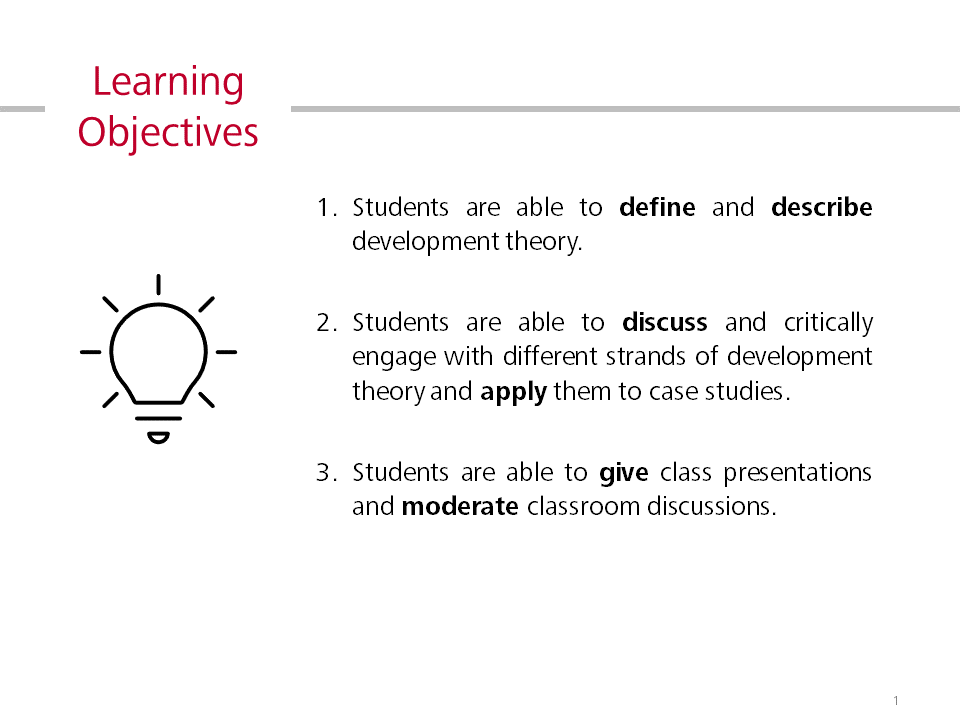Almost all college classes require students to meet a plethora of demands: Presenting papers and moderating discussions, active participation in class, self-directed learning, research, doing the required reading, and more. But what happens when students fail to see the point of their coursework? I attempted to solve this problem in a class for education majors in their freshman year of college. The results speak for themselves. First, in clearly articulating learning objectives, students were much more likely to accept the assignments they were being given. I also asked students to fill out an evaluation to assess how successful I had been in communicating these objectives to them, and I received valuable feedback from it.
Background
The class in question covers theories and research insights from person-oriented developmental psychology and theories of socialization. The following are common problems that tie in with the objectives for the class:
- Only a handful of students wrote summaries of the required reading because they felt it was an annoying, pointless task.
- Class discussions were modest both in terms of scope and participation. The majority of students seemed happy to take the theories they were being presented with at face value and had difficulty applying them to case studies.
- In some cases, students failed to see the point of presenting papers, or being asked to give presentations in general. Some even questioned the concept of self-directed learning, arguing that their instructor could just give a lecture on whatever topic they were supposed to learn about.
In response to these issues, I decided to clearly and succinctly outline course objectives as well as their pedagogical merits. Additionally, I asked students to answer a reflection question as a way to keep them engaged while they were working on their presentations.
Implementation
I worded the learning objectives in an output-oriented way that included the key competencies students were supposed to acquire by the time they give their presentations (Bachmann, 2018). I introduced students to these objectives during the first class of the semester along with the syllabus, and outlined them as follows:

- Students are able to define and describe development theory (Objective #1) by reading and summarizing the literature. Recontextualizing and revising the content before each class also helps improve comprehension.
- Through answering a reflection question during their presentations and active participation in class, students are encouraged to think critically about the theories they are presented with and learn to apply them to case studies (Objective #2).
- Additionally, once per semester, a group of students is asked to give a presentation and moderate a classroom discussion that ties in with the reflection question (Objective #3). Both are important soft skills that will come in handy for the challenges that await them in their future careers as educators.
Student Feedback
When mid-terms rolled around, I asked students to fill out a brief formative evaluation. They were supposed to assess if and to what extent they felt the course objectives had been achieved (so far). The evaluation itself was based on a five-point Likert scale (from ‘I completely agree’ to ‘I completely disagree’). I also asked them for their general thoughts on the learning objectives. The anonymous evaluation was hosted on Universität Regensburg’s E-learning platform.

Students responded positively to the first learning objective. They felt that summarizing relevant theories led to a deeper engagement with the content in general.
Responses to the second learning objective were more tepid, as students felt there was a lack of connection between theory and practice. The reflection question was generally well-received by students, who found it helpful in initiating fruitful classroom discussions. However, some noted that these discussions should be linked to the relevant theories and literature more tangibly. This was feedback I implemented right away and was able to take into account for the rest of the semester.
Student feedback for the third learning objective was also positive, with students feeling that they would continue to benefit from the skills they had acquired for their presentations throughout their studies.
Conclusion
By clearly articulating learning objectives, instructors can make a big difference in driving student engagement. In the beginning, I was worried the course objectives were too banal and simplistic, and that presenting them early on in the semester would not yield the desired results. This concern turned out to be unfounded, and my approach led to the following positive changes:
- Students were more willing to engage with the literature and summarize relevant theories. They handed in homework more frequently, and reviewing last week’s topic at the top of every class led to a more goal-oriented attitude.
- Students seemed to enjoy working on their reflection question during class, which led to organic and open discussions of relevant theoretical models.
- Compared to the previous semester, fewer students questioned the purpose of their class presentations.
The evaluation only took up a negligible amount of class time, and it allowed students to not only think about the intended learning outcomes, but also to reflect on their own learning and progress throughout the semester. Moreover, the results from the evaluation allowed everyone to draw surprisingly detailed conclusions they could not have come to had we not outlined our learning objectives early on in the semester.
What do you think: What are the objectives (perhaps even interdisciplinary ones) we should always strive to communicate to our students? Are there other ways to communicate intended learning outcomes? How can we start a conversation about intended learning outcomes besides evaluations? Let me know your thoughts in the comment section below!
References
Bachmann, H. (2018). Formulierung von Lernergebnissen. In H. Bachmann, Kompetenzorientierte Hochschullehre (E-Book): Die Notwendigkeit von Kohärenz zwischen Lernzielen, Prüfungsformen und Lehr-Lern-Methoden. Hep-Verlag.
Suggestion for citation of this blog post
Stümpfl, A. (2022, Februar 24). Three Reasons Why Articulating Course Objectives Is Vital. Lehrblick – ZHW Uni Regensburg. https://doi.org/10.5283/ZHW.20220224.EN





